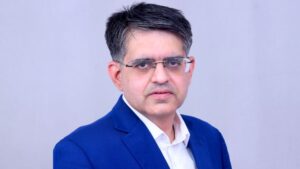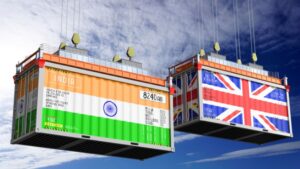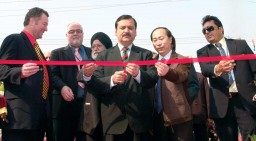
Considered to be one of the prime platforms for the industry to view and review latest technology for the apparel industry, the 9th edition of Garment Technology Expo 2008 (Jan 18 – 21) saw 300 exhibitors converge at NSIC Grounds Okhla, New Delhi. With more than 21,000 visitors thronging the corridors during the four-day event, most of the exhibitors were happy with the outcome. However, most did agree that the level of commitment was low as compared to the previous years, which many attribute to the slow down in exports in the last two years. Apparel Online brings insights into the event and some of the interesting technologies on display.
“The response at the fair only goes to show that the industry is in a positive mood though the investment has slowed down,” says Inderjit Sahni, CMD, GTE, organizers of the fair. Many of the exhibitors received some very serious enquires. “The interest in some of our machines particularly the finishing machines for trousers has been encouraging,” said Sameer Kukreja, Samtech. Added Rajesh Bihani, Rajasthan International, “The queries have been serious and we are optimistic of some good business after follow up.”
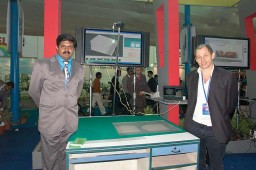
Some of the companies that booked/sold machines at the venue include DAYU, Churchill, Jap Stretch, Mehala (assyst bullmer), Magnum Resources, to name a few. The Indian agent of DAYU embroidery machines, Prateek was very upbeat, “We have been in the Indian market for only two years and have already sold 1000 machines,” he said.
Among the noticeable trends that emerged at the fair was the large presence of domestic players with almost all the participants saying that the visitor profile at the fair was heavily tilted in favour of such manufacturers. Another feature was the visits of a number of textile companies looking at forward integrating, “It is a positive trend as textile majors like Donear are searching for high-end technology to set up or expand their garment production capacities,” said Anil Anand, HCA. The two hottest retailers who created a stir at the fair were Vishal Retail and Koutons. The representation from export houses seen at the fair includes Gokal Chitranjan (LT Karle), Brain Long (Orient Craft), Neil Silva (Richa Global), Virender Uppal (Rich & Co.), Sanjay Khurana (Knitcraft), Dolly Nenwani (Shahi), et al.
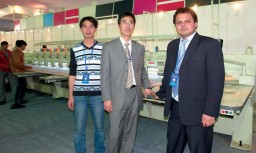
In the huge maze of technology were some new launches like the ‘n-shot’ that debuted at the Mehala stall. The innovative digitizer in one camera shot is claimed to be the most accurate, versatile and easy way to convert actual patterns into digitized patterns, which automatically appear on the screen with a simple shot. “The product is very appropriate for the industry to save on both time and effort that goes into manually digitizing patterns,” said Lew Geiger from ‘n-hega’ the manufacturers of this unique product, which received a good response from the visitors at the fair. “The user friendly nature of the concept is its biggest advantage,” added Lew.
Tajima has always been a name in embroidery machines. This year the company chose to showcase new models of embroidery and sequin machines. One such machine is the new twin type sequin device embroidery machine. This is the next generation of sequin device, immensely improving the sequin productivity. Also on display was the DG/ML by Pulse Embroidery Design Software, which offers the simplest solution for creating basic or complex designs, especially sequin or taping designs, quickly and efficiently.
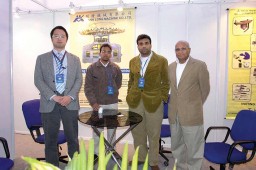
Sarabjeet Singh, MD Unity Overseas, Indian agent of Tajima, said that he was expecting the dollar to improve in the coming year, which he was confident would inturn improve market conditions and increase demand for his embroidery machines.
The Jack Holding Group had on display a new Bar Tacking machine, which is computer controlled and is suitable for medium weight fabrics. It operates at a speed of 400-2700 spm and offers a range of fifty designs. Also on display were the zigzag sewing machine, lockstitch straight button holing machine, computer controlled button mounting machine, high speed bar tacking machine and many more.
Among the noticeable trends that emerged at the fair was the large presence of domestic players with almost all the participants saying that the visitor profile at the fair was heavily tilted in favour of such manufacturers
Value-added products have always been a strong selling point for Indian clothing manufacturers and technology that can support this strength is very popular with the industry.
Technology providers worldwide are working on R&D to introduce upgraded machines for better design inputs and quality.
Richpeace Group Co Ltd with a long history of providing embroidery solutions to the garment and home textile industry is among the few early entrants to Indian market.
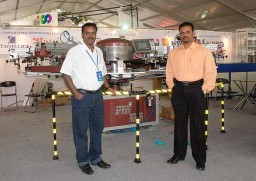
“At Richpeace we have a special R&D focus to bring products to satisfy the current need of the industry,” said Joy Tian. Richpeace offers the latest quilting/embroidery machine that has the flexibility to quilt with embroidery patterns. “The home fashion industry is increasingly looking at automated solutions and this new machine will give better quilting quality while also providing a strong design base,” added Joy. From the feedback that the company has received, the machine is poised to be a winner as home textile moves from necessity to aesthetics.
T Khanna and Co, which entered into a tie-up with the 100-year old Organ Needle Co. Ltd of Japan, launched Organ Needle in India at the GTE. Masato Ibaraki of the company’s Overseas Sales said that there isn’t much of a market for knitting machine needles in India but the company is hopeful of finding the need-gap for these needles and plugging it. “We could not cover the Indian market earlier because we did not have a partner. But after our tie-up with T Khanna and Co., we are confident of doing very well,’’ Ibaraki said.
WELCO Showcases Technology from Around the World
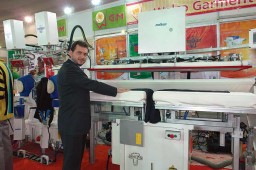
Welco Garment Machinery Pvt Ltd an ISO 9001:2000 company has for more than a decade now focused on bringing innovative concepts to India to facilitate and support the garment industry in the country. Among their brand affiliations are the best technology from Brazil, China and Turkey.
“It is exciting to present the industry with solutions that not only give value to their business but also fit their budgets,’ said Sanjeev Oberoi of WGM. Some of the interesting technologies with the company on display at the fair included Audaces, Kaigu and Malkan.
Audaces, Brazil showcased the Audaces Digiflash that has won many awards internationally for precision and time saving since it is possible to digitize a set of patterns all at once with a single click of camera with millimetric precision. “Our company has received many awards for innovation and we are constantly striving to provide solutions to simplify the digitizing process,” said Dawis AU Constantini representing the brand at GTE.
Among the winners with Kaigu, China was a needle detector that is highly sensitive to a steel ball of even 0.8mm with a detecting table width of 600mm and height of 100mm. Another product, which is comparable to the best in the market, is the automatic pressing machine. The prices though are much lower at almost 30-50% of what other high-end established brands are offering. “We realize that there can be no compromise on quality and with India becoming an important market for machine manufacturers it has become even more critical to maintain a balance of quality and price, in that order,” said Richard Maigang, President KAIGU. An ISO 9001 company, KAIGU is manufacturing 200 types of sewing equipments.
With the principle of high quality and competitive prices Malkan, Turkey was showcasing a computer controlled (PLC) touch screen regulated linear double leg line press system that ensures perfect crease on trouser legs in one quick operation. Interestingly, though the machine is comparable to German standards, the equipment is available at much cheaper price than other European machines. “We are a leading company from Turkey and have in our range more than 260 types of ironing equipment to suit different garmenting needs,” said Metin Kilic, Factory Manager, Malkan.
Churchill Has a Special Range of Sewing Machines to Improve Productivity
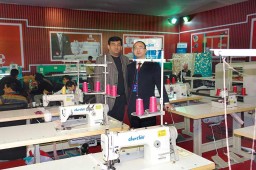
Manufacturers of the brand Churchill, Zhejiang Qiujing Sewing Machinery Co Ltd is a professional company from China engaged in the research and manufacture of sewing machines and spare parts. Along with subsidiaries Shanghai Qiujing Sewing Equipment Co, Ltd and Taizhou Qiujing Casting Co Ltd, the company has built up a system of research, development, production, testing, and after-sales services to meet international customers’ needs satisfactorily. The brand is now making a foray into the Indian market with Inside, a well known technology provider for the Indian market.
”Since establishment, our company has been making high quality products that create high value; the spirit is of seeking perfection while innovating. The job does not stop with sales, and service is guided by the principles of initiative, speediness, circumspection and satisfaction,” said Chen Hongbin, sales manager, Churchill.
The product range at Churchill consisted of specialized sewing machines, multi-needle sewing machines, high speed lockstitch machines and high speed over lock sewing machines. Among the most appreciated were the special sewing machines series that include the 2/3 needles feed-off-the-arm chain stitch sewing machine with puller, high speed feed-off-the-arm double chain stitch machine and the button attaching machine with auto trimmer and knot-tying notch.
At Churchill, R&D is at the core of growth and the team works continually to develop new products that customers require to enhance competitiveness. There is a concerted effort to give quality,” said Hongbin, “Each link in the production chain is permeated with international standard quality management systems.”
As the Indian market becomes more open to Chinese technology, Churchill is confident of making an impression with its balance of product range, quality and value for money machines. “We are looking at major business in India with our distribution partners who will support us with spares and after sales service,” concluded Hongbin.
Besides Churchill, Inside is working with Baishide and Sprayway. “We are always looking at fulfilling industry needs,” said Sanjay Seth, MD, Inside
Hca Shows India the Way for A New Beginning in Machine Technology
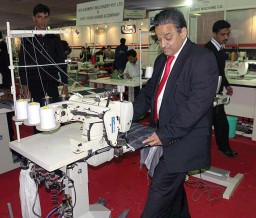
HCA, under the leadership of Anil Anand, is one of the largest providers of sewing machines, accessories and spares in India. Marketing tie-ups with international technology providers have helped it to further strengthen its base in the Indian market.
Moving on to the next stage of development, HCA has launched its own indigenous machines for the Indian market to offer technology for the specific needs of the manufacturers in the country. The button wrapping and knotting machine has been conceived and manufactured by the company completely from the scratch which gives the company the advantage of upgrading the same as and when needed as per market requirements.
The company will be working towards getting the machine patented in the near future. Another machine developed is the feed-off-the-arm machine in which the company has automated the basic machine to get higher efficiency and power saving. Both the machines have got an excellent response from the manufacturers and a number of orders have already been placed for them.
However, the thrust still remains upon its international brands that have earned the company a reputation of good quality supplier. Among their brands SWF, Kansai, Pfaff and Highlead had something new to show the industry. The SWF/DM series of machines launched this year are claimed to be the fastest embroidery machines with a speed of 1500 rpm and a memory capacity of 2,000,000 stitches. Kansai showcased its FBX series of multi needle double chain stitch machines of which the fully automatic waistband machine was the most popular.
Chinese company Highlead had on display the new lockstitch sewing machine series and the high speed needle-bar feed lockstitcher with edge cutter and automatic thread trimmer which generated a lot of interest in the visitors at the Expo. Pfaff machinery showcased its new automatic pocket-setting machine, and the blind stitch button machine, both being only of their kinds in the world.
Samtech has Innovative Technology for Unique Finishes
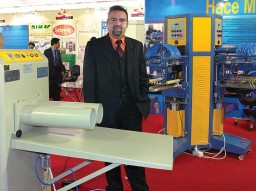
Samtech Garment Machines with its array of diverse brands was a popular exhibit at the GTE. Among the brands with the company the two that drew in the maximum interest were Kingtex and Protex. Innovative finishing equipments with the company were also very popular. The two on display were the Hace Machine to create moustache marks and the trouser reversible machine GJN from China, which is economically priced and does not have any real competition in the market at Rs 2 lakh.
The focus for Kingtex machines from Taiwan at the GTE was on the left-hand fabric trimmer machine, which is a part of the CT 9000 series of high-speed cylinder bed interlock machines, “The machine helps hemming operations on tubular fabrics such as cuffs or bottoms of T-shirts,” explained David Chin of the Ching Chi Machine Co Ltd, manufacturers of the Kingtex brand. The other machine on display was a feed-off-the-arm four needles six thread machine, also from Taiwan and launched in India for the first time.
The China based Toyou Sewing Machines Co. Ltd was displaying its Protex brand of sewing machines at the GTE. Its bar-tacking and button-sewing machines turned out to be real crowd pullers. Both these machines having electronic direct drive are claimed to be as good in quality as comparable Japanese products but at almost half the price. “In view of the buyers’ enquiries received by us, we feel that the machines would prove to be very successful in India due to their simple features and requiring not much training for the operators.
With the use of these machines, garment manufacturers would save both on time and labour costs,” said Chen Xiao Bo, General Manager, Protex.
New Products at Rajasthan International
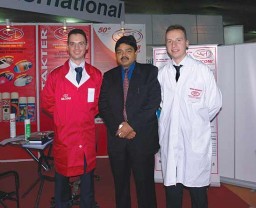
Rajasthan International was one of the stalls that presented a wide display of products from sewing needles to pressing equipment. Each brand had customized solutions for the industry. Among the many brands on display, Groz Beckert, Comel, Siliconi were most sought after though the other brands Juki (genuine parts), Cerliani and Kluber Madol did register their presence.
Needle manufacturer GROZ-BECKERT is moving from being a components manufacturer to becoming a systems manufacturer and supplier by launching a new product called GB SWITCH. Vice-President (Sales) Ranjit Singh claimed that the new product will help reduce the time of adjustment when one changes the size of the needle on machines, thereby reducing man-hours and increasing productivity. He was also upbeat about India’s future. “I believe the gap between China and India will considerably narrow down in the future,’’ Singh said.
Making their first entry into India at the last year’s edition of GTE, Comel Italy is a brand to watch out for in-steam generators and pressing tables. Working over the past year to formalize strategy and understand the Indian market for specialized needs, the company is now more confident of offering customized solutions for the industry. “Italian quality is known world over and as the global apparel market gets more quality conscious it has become imperative to use the best to add value to the final product,” said Betty Lancia, Export Sales Department, Comel.
Entering the Indian market just six months back, Siliconi Commerciale from Italy received much appreciation for its eco-friendly chemical range of aero-sprays for textiles and garments. A market leader in Europe for the last 50 years, the range with the company includes adhesives, lubricants, spot cleaners and protective chemicals. Among its most popular products is the PULIMAK, a spot cleaner for fabrics. “India is at an interesting juncture of growth and as it gains reputation as a quality manufacturer of garments, the scope for companies like ours which supply products that add value to the manufacturing process is immense,” said Andrea Conterno, sales manager Siliconi Commerciale.
Also upbeat of future growth in the country was Toshiyuki Yamanaka, Director Juki Machinery (India) who felt that despite the presence of many cheaper versions of sewing machines brand leaders like Juki had the edge. “We have a level of manufacturers who understand the importance of buying established brands that not only sell machines but complete solutions for technology, spares and training,” he said. With Rajasthan International handling the spare parts business, Juki is confident that the industry will not think of only price when making crucial decisions.
Digital printing in India is a fast growing area that can add value to a garment without the traditional use of embroidery and patchwork. There are still only a few companies that can give complete solutions in digital printing. Texsoco is one of them. The company is working with international companies to provide complete solutions at affordable rates. Among its associates is the innovative Japanese brand Mimaki that is making a steady entry into the Indian market with digital printing machines.
The most successful machine for them has been the Mimaki TX2 series, which is suitable for digital printing from sample creation to small lot production. “We are looking to provide not only the machine but complete solution from the conception of the idea to the actual manufacturing process,” said Masaaki Fujita, Senior Managing Director, Mimaki. The company is looking forward to introduce a new series specifically for the Indian market for which Fujita is in the process of studying the market and is hopeful that by the year-end the product should be available in the Indian market.
‘Customizing for Indian needs is the key to a bigger market share’ has emerged as the mantra for most Chinese suppliers. “As the demand for cost effective technology increases, our machines are gaining worldwide acceptance offering quality at a reasonable price” said Frank Wu, Manager International Business. Hikari may be new to the country but it has entered with a clear vision on what the industry requires and is promoting its direct drive machines, which they claim is almost the same as Juki machines but at half the price. Among the many options that they have for the Indian market, the H8801-7C is what they feel will work the best for the country. This model is a direct drive oil-free computerized high-speed lock-stitch machine, which picks up stitching speed from 0 to 4000 in just 0.12 seconds as against 0.20 seconds taken by other similar machines.
However top-end automated technology is still revered by the industry, which was obvious from the busy stall at IIGM where the GSD and Eton systems were on display. GSD Corporate specializes in providing world class, sector specific solutions for accurate and consistent prediction of method, time, cost and capacity. GSDtm eliminates ‘guesswork’ and provides the opportunity to accurately measure the manufacturing process within the environment, giving control to the manufacturer over the time and the cost.
Paul Timson, MD of GSD noted that it was time for the Indian manufacturers to start taking decisions towards updating their technologies so that they do not lag behind their competitors.
ETON Systems showcased ETON 5000 Syncro machine, a new system platform, which provides a controlled and safe flow of products with double the capacity. Claude Kehren, Area Manager, Central Europe-India, is looking at 25-30% more sales for this new product which is 25% more expensive than its previous model, which was priced at US $ 3200 per work station for a group of 40. “India being the second largest market in volume after China for us, we are aiming to promote this highly evolved system with a perspective of running it for the next 20-30 years with no problems of having to further upgrade it. The ETON 5000 has been built with such an outlook,’’ Kehren said.
Machines made indigenously also made an impact. An ISO 9001-2000 company and a pioneer in garment/textile printing machinery, Cheran launched the first indigenously manufactured automatic screen-printing machine in India at the GTE. The machine is already a hit with their existing customers down south and its display at the GTE was with the intent of showcasing the machine to prospective clients in north India. The automatic textile-printing machine, called the ‘Sprint Rover’, offers a computerized control panel with a feather touch screen for easy navigation and programming. Print start and finish can be both automatic and manual. Mohan Anand , MD Cheran was very happy with the response as they had managed to book some orders.




